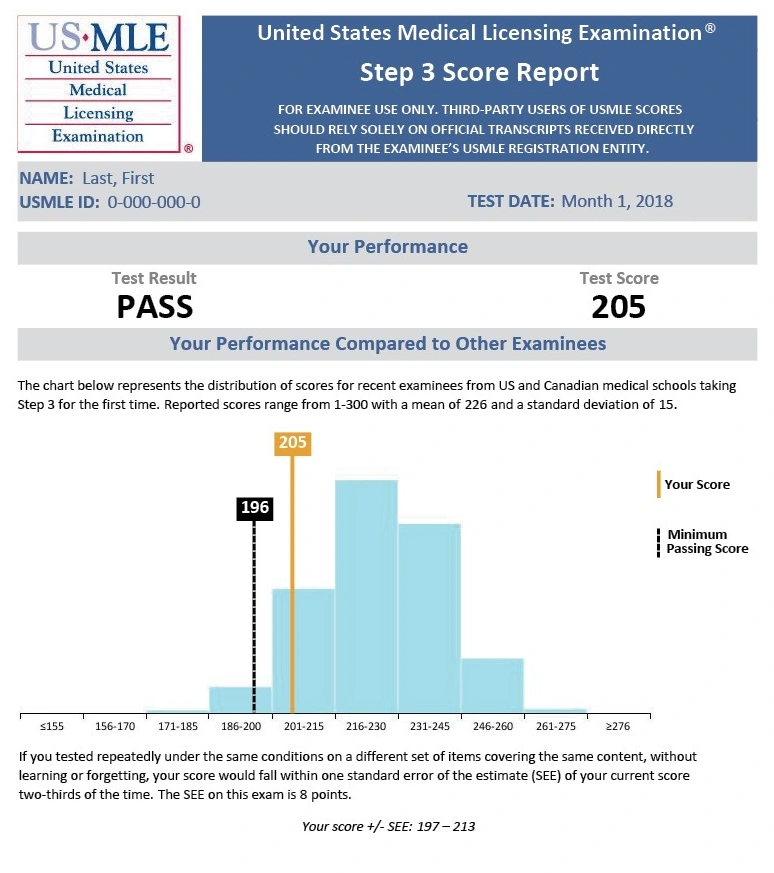USMLE Step 3 is the final exam in the USMLE series. It checks whether you can use medical knowledge and clinical reasoning to care for patients on your own.
This guide explains who can take the exam, how to register, what the test looks like, ways to prepare, and how scoring works. If you are getting ready for Step 3, this will give you clear, simple steps to follow.
Why USMLE Step 3 Matters?
The USMLE Step 3 is more than just a test of what you know. It looks at your overall ability to care for patients on your own.
Passing this exam is very important for three main reasons:
- To get your full medical licence. You must pass Step 3 to get a full medical licence to practise in the US. This shows you are ready to work as a doctor without someone supervising you.
- To help your career: For international doctors, a pass in Step 3 is very important. It can help you get a training job (residency) in the US and the right visa to work there.
- To work independently. The exam tests whether you are ready to make decisions on your own. It checks that you can manage patients and use your knowledge in real-life situations.
Exam Format and Structure
The formation of the USMLE Step 3 test is important to learn. It will assist you in getting ready for the test.
The USMLE Step 3 exam takes place over two days. Each day has a different focus.
Day 1: The First Day (Foundations of Independent Practice)
The first day tests your core medical knowledge. It checks if you understand the basic science behind diseases and treatments.
- What to expect: 232 multiple-choice questions.
- Format: The questions are split into 6 sections. You will have 60 minutes to answer about 39 questions in each section.
- What it includes: It comprises how and why diseases happen. Moreover, the pharmacology and diagnosis of diseases.
- Total Duration: It is about seven hours, along with breaks and a tutorial.
Day 2: The Second Day (Advanced Clinical Medicine)
The second day tests your ability to be a doctor. Like in a real hospital or clinic, it all comes down to making decisions and cooperating with patients.
- What to prepare for: 180 multiple-choice questions. With 13 dynamic situations make up the case simulation.
- Format: There are six 30 to 45-minute portions in the questions. You can examine and treat virtual patients in a timeframe through the simulations.
- What it addresses: Your clinical judgement is the main focus of this day. It tests how you manage both emergency and long-term patient care.
- How long it takes: Including breaks, this is a longer day that lasts about nine hours.
Step 3 Vs. Step 1 and Step 2 CK
The table below introduces the important distinctions between focus, form, and evaluation of clinical application skills. It is a comparison between the USMLE Step 3 examination and other stages (Step 1 and Step 2 CK).
| Feature |
USMLE Step 3 |
USMLE Step 1 & 2 CK |
| Focus |
Clinical application of medical knowledge |
Basic medical sciences and understanding |
| Case Simulations |
Includes 13 case simulations |
It does not include case simulations |
| Exam Format |
Two-day exam with MCQs and case simulations |
Single-day exam with MCQs only |
| Assessment |
It evaluates your ability to practice medicine independently |
Assesses your knowledge and understanding of medical sciences |
Eligibility Requirements
Before registering for USMLE Step 3, you must meet specific eligibility criteria, ensuring you're fully prepared to take on the challenges of independent medical practice:
- Completion of USMLE Steps 1 and 2 CK: You've demonstrated a solid foundation in medical knowledge and clinical skills by passing the first two steps of the USMLE.
- Physicians Medical Degree: Have an MD degree or equivalent that has been granted by a US or Canadian accredited medical school or an equivalent to a facility listed in the World Directory of Medical Schools (WDOMS).
- Postgraduate Training: You must have completed or be within the completion of one year of postgraduate training in a US Graduate Medical Education (GME) program in compliance to state board requirements.
- ECFMG Certification: International Medical Graduates (IMGs) should have a valid Education Commission of Foreign Medical Graduates(ECFMG) certification and then have a United States medical license.
Eligibility Criteria Summary
| Eligibility Requirement |
Details |
| USMLE Steps 1 and 2 CK |
Must be passed before registering for Step 3. |
| Medical Degree |
MD degree from an accredited US/Canadian medical school or equivalent from a WDOMS-listed institution. |
| Postgraduate Training |
At least one year of postgraduate training in a US GME program meeting state board licensing requirements. |
| ECFMG Certification (For IMGs) |
Must possess current certification from the Educational Commission for Foreign Medical Graduates (ECFMG). |
To find more specific eligibility requirements, go to the USMLE site (www.usmle.org) and the FSMB site (usmle.fsmb.org).
USMLE Step 3 Registration Process
The registration process of the USMLE Step 3 consists of a number of actions. It is used to ensure that you are eligible and prepared to take the exam.
Step 1: Create an Account
Visit the FSMB portal and register if you are a new visitor. Or log in using your account.
Step 2: Complete the Online Application
Fill out the online application by providing your personal information, evidence of eligibility, and medical education details. Choose a time frame of three months, during which you are planning to take the USMLE Step 2 CK exam.
Step 3: Payment of the USMLE Exam fees
The USMLE Step 3 fee in the year 2025 will be $925 for US/ Canadian medical school graduates. For IMGs, it will be $1,025. The USMLE examination fees is also liable to change. You can visit the official FSMB site to know the up-to-date details.
Step 4: Submit Eligibility Documentation
Upload your files that verify your medical education and postgraduate training. IMGs will also have to provide their ECFMG certificate.
Step 5: Get Your Scheduling Permit.
Upon the approval of your application to take the USMLE Step 3, you will be emailed a scheduling permit. Keep this permit to schedule your exam date on the Prometric site.
Essential Advice on USMLE Step 3 Preparation
USMLE Step 3 requires proper preparation before you can pass. Below are a few steps you can follow to prepare adequately:
Build a Study Schedule
Proper planning is hence essential in creating a study course. This is how you can do it:
- Determine your knowledge level: Take a practice test so that you can understand your weaknesses and your strengths. It will enable you to work on areas of improvement.
- Schedule a Study Timetable: Give at least 3-4 months of intense studying time, breaking it up weekly. Accordingly, it shall help you cover everything relevant sufficiently.
- Determine Key Topics: Focus on high-yield areas such as internal medicine, emergency medicine, obstetrics, and gynaecology. Read about clinical guidelines and management of these topics.
- Include Practice Questions: Use practice questions to help you learn and become comfortable with the format of the test.
- Revision Study Plan: During the last weeks, practice important concepts and full-length practice tests under timed conditions.
Invest Your Time in Practice Exams
Practice examinations are a goldmine when it comes to USMLE Step 3 preparation. They enable you to get accustomed to the pattern of the exam and improve your time management.
Some useful resources are:
- NBME Self-Assessment Tests: Self-assessment tests are available from the National Board of Medical Examiners (NBME) and are very similar both in format and content to the Step 3. They are perfect for testing your preparedness.
- UWorld Step 3 Qbank: UWorld has a vast collection of question banks and a lengthy step-by-step explanation of each answer. It is very useful in practising the MCQs and case simulations.
Review Foundational Resources
In order to sufficiently prepare for USMLE Step 3, review the following resources:
- First Aid for the USMLE Step 3: It is a pocket reference of high-yield topics that are encountered on the exam. It is convenient for doing rapid reviews and highlighting essential points.
- Master the Boards USMLE Step 3: Author Conrad Fischer makes it possible for you to focus on information that is likely to show up on the exam.
- Step-Up to Medicine: This is a thorough analysis of internal medicine. This is an important section of the test. It is also useful for clarifying your knowledge of difficult medical topics.
Mastering Case Simulations
Computer-based case simulations (CCSs) are a hallmark feature of the USMLE Step 3. They require you to test patients on cases spanning periods of time and are based on real-life clinical situations.
Now, let's get familiar with the CCS format. Here, you are introduced to hypothetical patient cases that play out over a simulated time. Depending on the patient's changing status, you are required to decide on diagnostics, treatment plans, and follow-up care.
- Case Management: Each of the case simulators involves making clinical judgments and effective patient care management. You have to order tests, initiate treatment and make adjustments based on the patient's response.
- Time Management: It requires about 10-20 minutes/case, and you will need to manage your time adequately to review everything about patient care.
- Practice: Regular practice with CCS cases will help you familiarise yourself with the format. Ultimately, practice improves your ability to successfully handle patient situations.
Preparing for the Exam Day
What you can do on the exam day to be prepared:
- Arrive Early: Reach the examination centre at least 30 minutes in advance. Do this to avoid delays and ensure a smooth start.
- Bring Required Documents: Carry your scheduling permit, valid identification, and any other required documents.
- Stay Focused and Relaxed: Remain calm and concentrated. The key to answering every question is time management.
Post-Exam Procedure
When you pass USMLE Step 3, your score will become available approximately 4-6 weeks after you take the test. Your score report will include detailed information about your performance, e.g., a pass or fail and a score on each section of the exam.
USMLE Step 3 Score Report
Pass/Fail Status
- Passing is needed in order to qualify for a medical licence.
- USMLE Step 3 score scale: 1 to 300.
- Average passing score: 196-210 (varies with year and administering test-licensing board).
- Passing the test signifies licensure readiness.
Performance Breakdown
- Multiple-choice (MCQ) questions: Evaluate your clinical expertise.
- Simulations of cases (CCSs): Evaluate real-world clinical skills.

Using the Report
- It determines strengths and weaknesses.
- It assists one in highlighting regions of improvement.
| Component |
Details |
| Pass Score |
196-210 (Varies annually) |
| MCQ Section |
Assesses clinical knowledge |
| CCS Section |
Tests real-world patient management skills |
| Score Range |
1 to 300 |
To Conclude
Passing USMLE Step 3 is a testament that identifies you with readiness to practice medicine on your own. Similarly, knowing the format of the exam, fulfilling eligibility criteria, and using effective study strategies can make you confident when facing Step 3. Make sure you use top-notch USMLE Step 3 resources, practice a lot, and use your time properly when taking the exam.
You can prepare in a structured manner with MOKSH Academy. Therefore, you will be sufficiently ready to take on the final step of being a licensed physician in the United States. All the best.
Disclaimer
USMLE® is a joint program. The Federation of State Medical Boards (FSMB) and the National Board of Medical Examiners (NBME) are co-sponsors. None of the trademark holders hhasaaffiliationith MOKSH Academy or this website.
ACGME® is a registered trademark of the Accreditation Council for Graduate Medical Education.
The ECFMG® is a registered trademark of the Educational Commission for Foreign Medical Graduates.
The Match® is a registered service mark of the National Resident Matching Program® (NRMP®). The NRMP has no affiliation with MOKSH Academy.
Electronic Residency Application Service (ERAS®) is a program of the Association of American Medical Colleges. It has no affiliation with MOKSH Academy.
Test names and other trademarks are the property of the respective trademark holders. None of the trademark holders have an affiliation with MOKSH Academy or this website.




